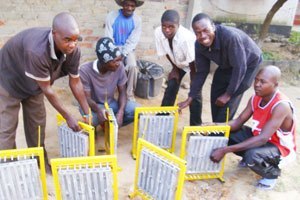
A Chitungwiza-based businessman, Tongayi Marufu, has embarked on a candle-making project in the sprawling St Mary’s suburb in an effort to empower the local community and reduce drug abuse among the youths.
Report by Gumisai Nyoni
Officially launched last week, the project has already attracted the attention of many unemployed residents, who hope to benefit from the initiative through creation of self-employment.
Speaking to Standardcommunity last week, Marufu said he was jolted into action after realising the high levels of unemployment and delinquency in Chitungwiza, a town located south of Harare, with a population of about one million people.
“I was motivated [to start the project] by the high level of unemployment in Chitungwiza, which has resulted in many people abusing drugs as a way of easing stress,” he said.
“Most of the residents here spend most of their time roaming the streets. This creates many social ills, which can be contained if they get involved in projects that allow them to fend for themselves.”
Marufu said he had targeted St Mary’s suburb as the springboard of the project because “it is ridden with criminal activities” such as theft, prostitution and robbery.
- Chamisa under fire over US$120K donation
- Mavhunga puts DeMbare into Chibuku quarterfinals
- Pension funds bet on Cabora Bassa oilfields
- Councils defy govt fire tender directive
Keep Reading
The project started off with 150 candle-making machines and more than 200 families have since registered to participate in the initiative. The families would pay back towards payment for the machines after selling the candles.
Marufu said they would establish selling points at populous places such as Huruyadzo and Chigovanyika shopping centres.
He expected brisk business in St Mary’s as most homes are not connected to electricity while load-shedding would also increase demand for the candles.
“We are still in the initial stages, but our wish is not to confine the project to St Mary’s. We envision development that encompasses the greater part of Chitungwiza,” he said.
One of the project co-ordinators, Virimayi Zungunde, was upbeat saying the development was a noble way of generating employment for the community.
He added that the project would also play a role in cementing social ties, a critical element to steer development.
“I think the community will be united to focus on self-employment as a way of empowerment. What Mr Marufu has done is important and will help us improve our welfare,” said Zungunde.
“Our prayer is that the project does not get disturbed by lazy people who don’t want to work for themselves.”
One of the first beneficiaries of the project, Tobias Chiombamanja, said: “We must support this project for it to be a success. If we think Marufu injected money so that we can loot, then we will not realise any profits. I encourage people to be united because success comes from us.”
Community empowerment projects lacking
With the introduction of the multi-currency regime in 2009, Chitungwiza realised a boom in the construction of small shopping malls, but there has notably been lack of developmental initiatives that empower the community to be self-sustainable.
The situation has been worsened by the absence of vibrant industries with a potential to create employment for the rising population in the former dormitory town.
It is estimated that Zimbabwe’s unemployment rate tops 85%, fuelled by massive company closures and retrenchments of the past decade.












